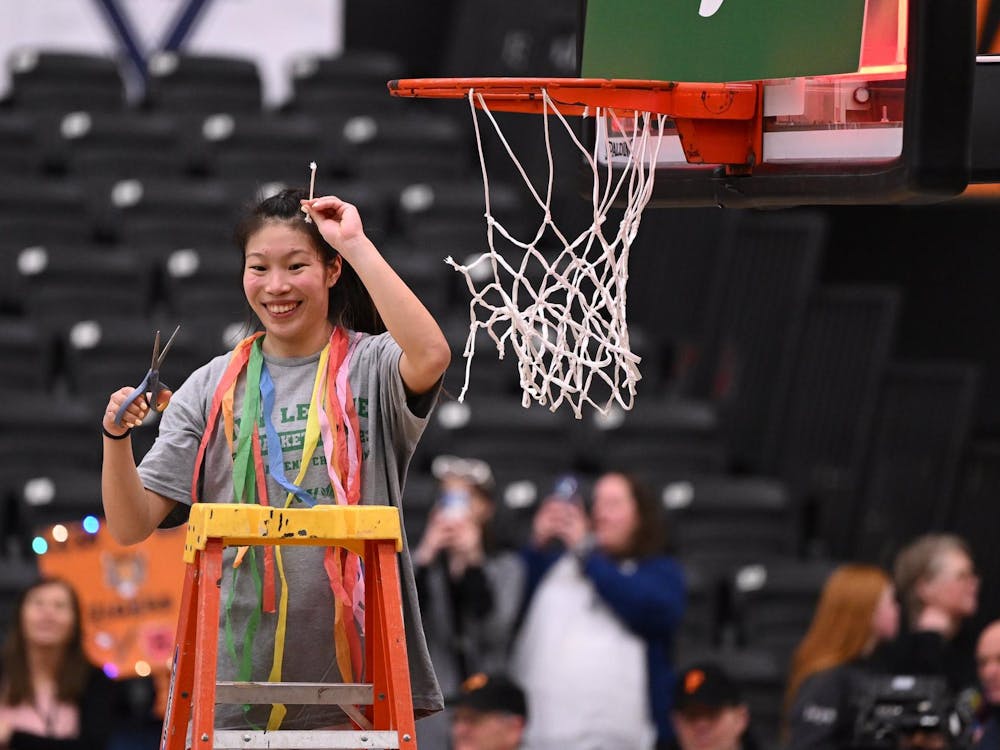In the weeks following the Russian invasion of Ukraine, many members of the Princeton community have sought out avenues to express solidarity with the Ukrainian people.
On Feb. 25 — just a day after the initial assault began on Feb. 24 — students, faculty, and local residents gathered outside of Nassau Hall for a rally. In the days that followed, community members have raised funds for humanitarian organizations working in the region, signed onto petitions of support, and formed new campus groups centered on the conflict.
On Feb. 28, a group of Russian students circulated a Letter of Solidarity with Ukraine on University email listservs; the letter was later published in The Daily Princetonian.
In an interview with the ‘Prince,’ Kate Ivshina ’23 said that the idea to write the letter came to her as she felt “very helpless” while reading the news.
“I felt that not enough people on campus care about this right now, or like, not enough of this information [is] shared here,” Ivshina said. “And so we decided [that] the first step could be writing a letter showing that we support Ukraine.” The letter called on University President Christopher Eisgruber ’83 to publicly support the people of Ukraine and condemn the Russian invasion.
A few hours after the letter was sent out, Eisgruber issued a statement about the war. Another organizer behind the letter, Nadya Fishchenko ’24, said that she appreciated that the president’s statement was not anti-Russian.
“It is very important for us to differentiate this war from our nation and our home country,” Fishchenko, a Russian citizen, said. “Because, yes, the Russian army invaded Ukraine, but we — and a lot of Russian people, both in Russia and abroad — are against it.”
Politics professor Mark Beissinger, an expert on the post-Soviet states, told the ‘Prince’ that an independent poll found that approximately half of the Russian population supports the war. “Which is actually pretty astounding,” he said of the poll. “When a country goes to war and only half of your citizens support it, that’s not really a very good degree of support from the public.”
He noted that the poll also showed that about a quarter of Russians firmly oppose the war.
“But, what I think is interesting is [that] a lot of people in Russia — a significant number of people who support the war — don't really know why the war is taking place,” he said.
Liza Rozenberg ’22, another organizer of the letter and a Russian citizen, shared her frustration with her government, but emphasized the importance of individuals like her taking action.
“I guess the one thing that we can do is use our voice and the freedom of speech that we have here that people back home don't have,” Rozenberg said.

The same group of students has also launched an organization called “02.24.2022,” named after the date of the invasion. As of March 17, they received enough signatures necessary to be recognized as a student organization by the Office of the Dean of Undergraduate Students.
The student group’s goal, according to the students, is to provide accurate and reliably sourced information about the war to Princeton students and to organize future acts of solidarity.
Also on campus, the Center for Jewish Life (CJL) took action to fundraise for Ukraine during the holiday of Purim on March 16 and 17. The holiday of Purim traditionally emphasizes giving and generosity; it is a custom to gift bags of treats to friends and family, and donate to charity.
In the days leading up to Purim, CJL student leaders sold gift bags in both Frist Campus Center and in the CJL to students. They also took donations via Venmo. The money raised from the gift bags and donations went to the Hillel International Emergency Relief Fund.
“We're part of a worldwide network of more than 550 Hillels around the world, five of which are in Ukraine, one of which was bombed by the Russians,” CJL Executive Director Rabbi Julie Roth told the ‘Prince.’ The Hillel chapter in Kharkiv was destroyed amid the war on March 3.
Roth also spoke about how Hillel organizations across Europe are assisting refugees.
“Students who are involved in the Hillel in Poland are running a daycare, basically, for the children of refugees,” she said. “The Hillel organizations aren't just helping students and professionals who work at Hillels in Ukraine, but they're taking in all kinds of refugees, not just Jewish refugees.”
Sarah Bock ’24, a student leader at the CJL, told the ‘Prince’ that the fundraiser was a success. “Because it's such a universal issue on campus — at least I felt like — when we were in Frist, we got a lot of attention that I don't think we necessarily would have with a different cause,” Bock said.
At the time of publication, the CJL had raised more than $600, according to an email to the ‘Prince’ from Roth, and the Princeton Orthodox Union Jewish Learning Initiative on Campus had also separately raised over $1,100 to directly support Ukrainian people, according to Rabbi Mati Kahn in a statement to the University.
The Scharf Family Chabad House of Princeton had also independently raised over $3,000 to send to Ukraine, according to the group’s Instagram story.
Hope Perry is a News contributor and the Head Podcast Editor at the ‘Prince’ who has covered USG events, U.S. politics, and student activism. She can be reached at hperry@princeton.edu or on Twitter @hopemperry.








